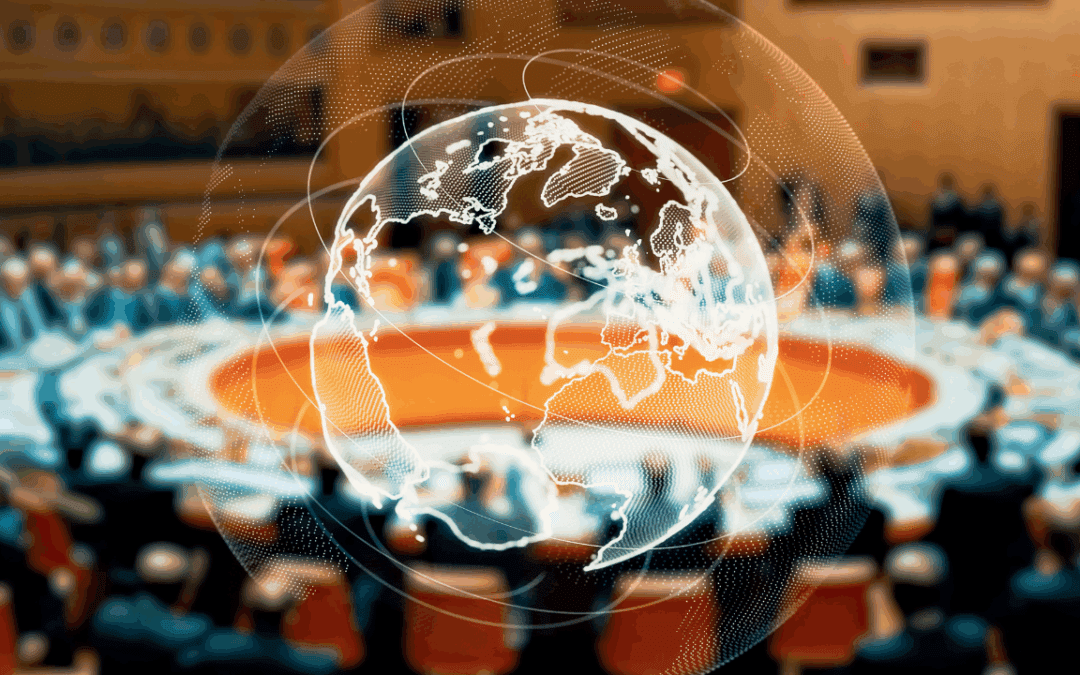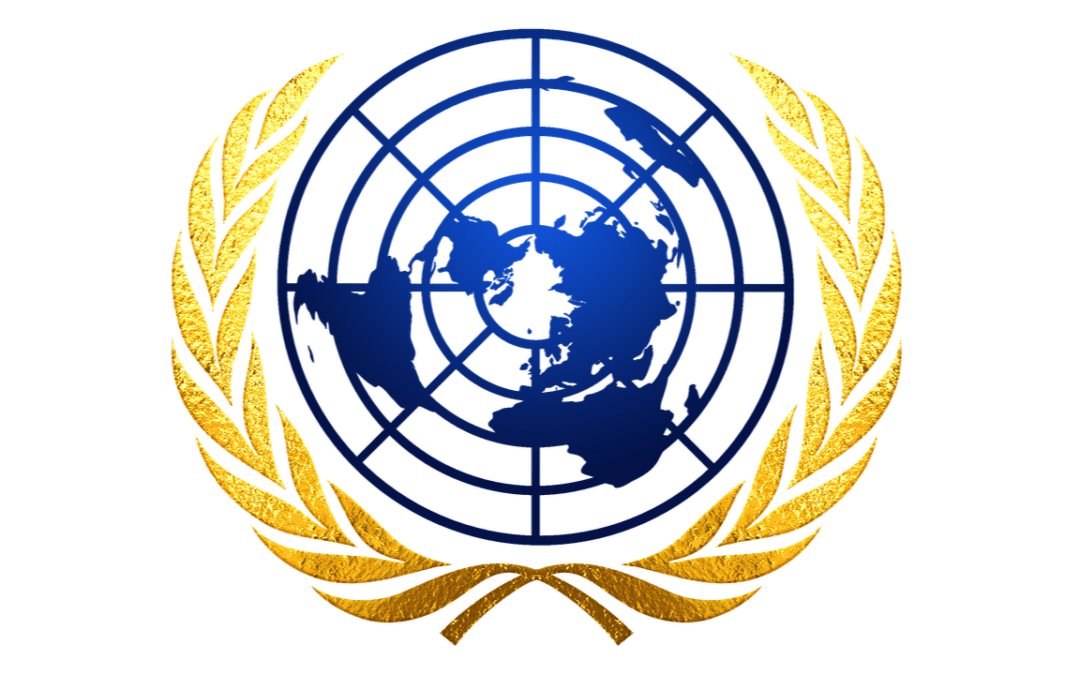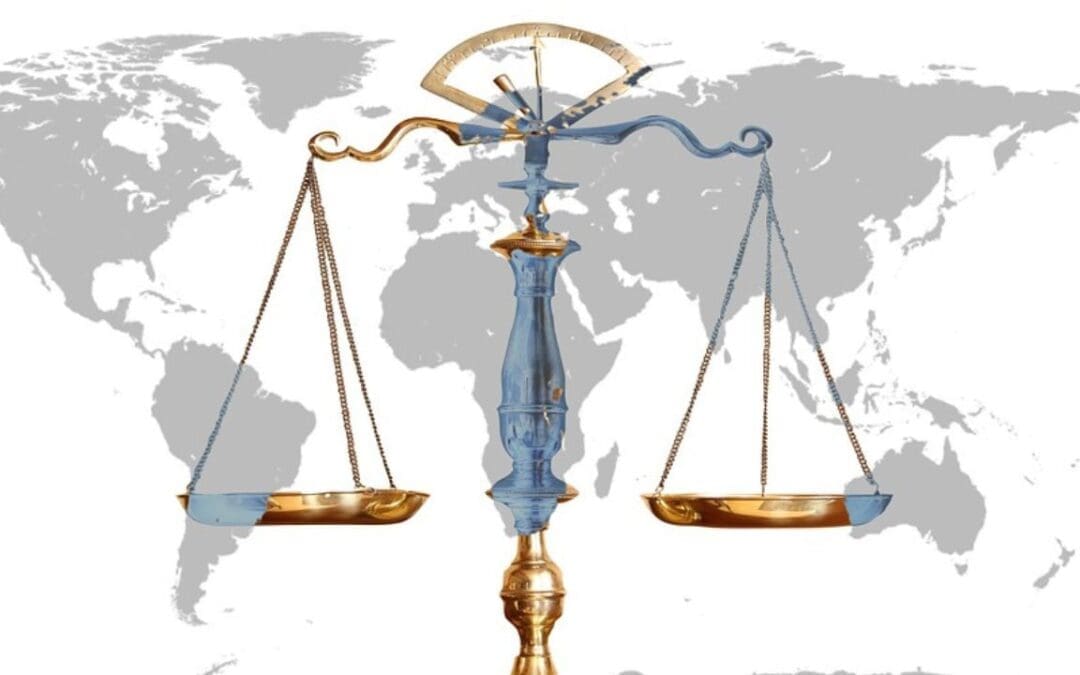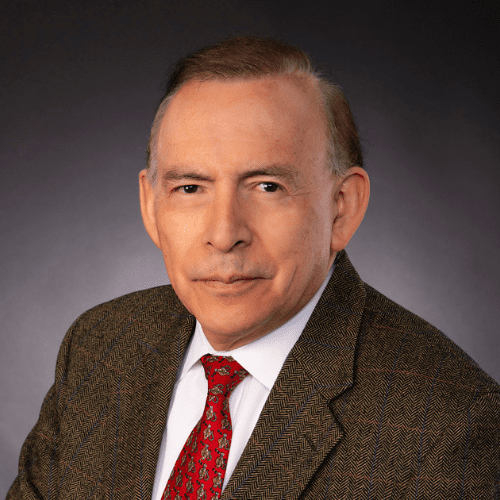
by Jacopo DeMarinis | Oct 9, 2025 | World Federation
On September 18th, the United Nations Security Council, the principal organ of the United Nations entrusted with maintaining international peace and security, introduced a resolution demanding an immediate and permanent ceasefire in Gaza, the immediate release of all hostages, and the lifting of restrictions on humanitarian aid to prevent the growing famine. Fourteen members of the fifteen-member council voted in favor. One member, the United States, voted against it. The resolution was thrown out.
Does this seem fair to you? Well, this is par for the course at the UN Security Council. Five permanent members (P5)—China, the United Kingdom, the United States, Russia, and France—can veto any resolution, immediately discarding it. The significance of this is heightened by the fact that the Security Council’s resolutions are binding, unlike the more representative General Assembly, whose resolutions are merely recommendations. In the past, the Security Council has passed binding resolutions authorizing dozens of peacekeeping operations to address conflicts in the Balkans, Angola, Somalia, Haiti, and other countries.
Unfortunately, history has shown that the P5 will leverage their position in the Council to block a resolution that threatens their interests, as Russia did regarding a February 2022 Security Council resolution that would have demanded an end to the Ukraine war. More recently, Russia blocked a UN Security Council resolution calling an end to the civil war in Sudan. Since the inception of the Security Council in 1945, a veto has been cast 326 times; out of these, Russia has wielded the veto 161 times, the United States, 94 times, China, 21 times, and the United Kingdom and France, 32 and 18 times, respectively.
To enhance the P5’s accountability to other UN countries, the UN General Assembly recently passed a resolution urging the veto-casting member to provide an explanation for their decision. This resolution harks back to the 1950 UN General Assembly “Uniting for Peace ” resolution, which provided the General Assembly with the opportunity to address any matter pertaining to international peace that has paralyzed the UN Security Council.
“Great power” capture of the global landscape is also apparent in nuclear disarmament issues. The Treaty on the Non-Proliferation of Nuclear Weapons (NPT), which entered into force in 1970, requires nuclear weapons states, which include the P5, to negotiate the complete disarmament of their nuclear weapons. Despite this mandate, nine countries now have nuclear weapons and these countries are upgrading their “strategic nuclear forces,” in defiance of the NPT. Unsurprisingly, these same countries unanimously oppose the Treaty on the Prohibition of Nuclear Weapons (TPNW). The TPNW was borne out of non-nuclear weapons states’ frustration with noncompliance with NPT, by prohibiting any country party to the treaty from possessing nuclear weapons.
Then, there is climate change. Despite embracing green energy more, the world’s top polluters, including the United States and China, are still burning carbon dioxide at an unsustainable rate which threatens to raise global temperature increase to above the 1.5 degree Celsius limit set by the Intergovernmental Panel on Climate Change. This means that the worst effects of the climate crisis will not be averted. Furthermore, the fact that powerful countries like the United States have openly defied international climate treaties like the Paris Accords- which the United States withdrew from in 2020, rejoined in 2021, and then withdrew from again with the re-election of Donald Trump- weakens international climate coordination and fosters a culture of unaccountability and skepticism about global climate governance.
Furthermore, the COP29 conference last year in Baku is seen by many climate activists and governments in the Global South as a failure, albeit a step in the right direction. Wealthy countries agreed to commit $300 billion a year by 2035 to aid developing countries in reducing carbon dioxide emissions and transitioning to clean energy, which is far from the $1.3 trillion annually for climate financing that developing countries were pushing for. It’s ironic that the burden will be felt mainly by small island states and developing countries in the Global South that have contributed least to the crisis.
To address this climate injustice, the Pacific Island nation of Vanuatu initiated proceedings with the International Court of Justice (ICJ) in 2023, requesting an advisory opinion regarding the legal obligations of states with respect to climate change. Vanuatu’s decision to present a UN General Assembly resolution initiating climate proceedings with the ICJ was due mainly to the determined climate justice efforts of youth activists from Pacific Island states, including civil society organizations like World’s Youth for Climate Justice. While the ICJ’s advisory opinions are not legally binding on countries, the ICJ’s ruling will hopefully set a precedent regarding international action to address climate change. Updates regarding the ICJ’s climate case can be viewed here.
It’s clear that the big power-dominated international order is unsustainable. The Bulletin of the Atomic Scientists’ decision to move the Doomsday Clock to 90 seconds to midnight, the closest to complete catastrophe we’ve ever been, has highlighted the importance of constructing an international system characterized by political equality and social and economic justice. The actions detailed above- creating the TPNW, involving the ICJ in climate matters, holding the P5 accountable to the General Assembly, and proposals for comprehensive Security Council reform are a definite starting point.
However, we must treat not just the symptoms but also the underlying disease: gross global power imbalances. This requires strengthening international law and modifying and/or establishing global institutions. Civil society organizations like Democracy Without Borders and Citizens for Global Solutions advocate for establishing a United Nations Parliamentary Assembly, which would allow the citizens of the world to directly elect their UN representatives. This Parliamentary Assembly would eventually be empowered, in conjunction with the UN General Assembly, to pass universally binding resolutions regarding global issues. Such an assembly in the UN system would accord currently overlooked countries, concentrated in the Global South, with much more decision-making power than they currently have, building a United Nations that truly serves all of humanity.
Other possible adjustments to the structure of global politics to ensure true political equality include ensuring the universal jurisdiction of the International Criminal Court, which the United States, Russia, China, and about sixty other countries are currently not party to. We should also strengthen the jurisdiction of the International Court of Justice, which the LAW not War campaign is focused on. In addition, we could establish an International Court for the Environment to settle cases pertaining to the environment and climate change.
Big power domination of our global politics is not merely an international relations issue. It is a matter of social justice, economic justice, and political equality on a global scale. It’s about whether we are to live on a livable planet and build a sustainable future for future generations. It all starts with constructing a more just, multilateral international order that answers to all of us. The time to start building it is now.

by Jacopo DeMarinis | Dec 23, 2022 | World Federation
A world government is in the making, and we desperately need one. Why?
The world today is in turmoil, and our current global governance infrastructure (the UN, the International Court of Justice (ICJ), etc.) has proven itself unable to rise to the challenge, despite its best efforts. The undemocratic and ineffective UN Security Council, where five permanent members wield a veto that can block any binding resolution related to peace and security, routinely fails to prevent international political conflict. For example, Russia, a permanent member of the Council, has repeatedly blocked resolutions related to the Russian invasion of Ukraine. Individual countries, especially the US, Russia, and China, are not sufficiently held accountable when they don’t adhere to the provisions of international climate change or nuclear weapons control/disarmament treaties. This was the case when the US pulled out of the Paris Accords and Russia refused to support a recent UN version of the Treaty on the Non-Proliferation of Nuclear Weapons (NPT). Human rights violations abound despite the Universal Declaration of Human Rights and the International Covenant on Civil and Political Rights.
Why are our international institutions incapable of addressing these threats to global security?
The reason is that one desperately-needed element is missing from the global security architecture: international law. As esteemed world federalist and Nuremberg War Crimes Trial prosecutor Benjamin Ferencz stated, “the only way to… solve the problem of war… is to replace the law of force with the force of law.” The law of force characterizes today’s international system as countries exercise absolute sovereignty and can invade other nations, disregard international treaties, and abuse their citizens or migrants with impunity. And, when other countries attempt to de-escalate a crisis or urge the offending government to obey international norms and declarations, there is little that can be done beyond condemning the country at the UN or imposing sanctions, which hurt the entire country. And that is the way of a world governed by the law of force… injustice leads to more injustice.
A democratically elected world government can end this cycle of injustice by providing stability and security in a chaotic international environment desperately in need of some sanity. It would do this by requiring that each country’s national military be reduced to what is required for internal policing, diverting military budgets into domestic infrastructure that will enhance citizens’ quality of life. An “international peacekeeping force” would be created to enforce world law and prevent interstate conflict as part of an international “executive branch.”
But do not despair! A world government is more than feasible; it is in the works.
History has demonstrated that, as economic and technological change transformed countries, their political system likewise changed to safeguard people’s rights and security. Sovereignty resided in clans and tribes, then towns, cities, dynasties, and nation-states as socioeconomic conditions obligated people to entrust their security to more centralized governments with greater jurisdiction, capable of preventing internal conflict. The most recent “socioeconomic conditions”- the Industrial Revolution, the development of the atomic bomb, and the digital revolution- have given rise to a technological, economically, and physically interconnected world that needs an interconnected world government capable of protecting us all from the ripple effects of the abuses caused by absolute sovereignty. The most extreme case of absolute sovereignty annihilating the world is a country unilaterally starting a nuclear war.
This historical and inevitable transfer of authority to higher levels of government with greater jurisdiction is exemplified by American history when the Constitutional Convention of 1787 formed a federal government despite some delegates’ objections. This federal government worked to ensure internal unity and stability by preventing the South from destroying the United States to preserve slavery and- despite failing to prevent many human rights abuses against African Americans and other marginalized groups- eventually successfully passed landmark legislation like the Civil Rights Act of 1964 that moved the needle toward greater justice and equality for all. And this was done while protecting states’ rights, just as a world government would protect national sovereignty. Were it not for a strong, centralized government, the separate states would probably have failed to effectively address the secession challenge and slavery might not have been abolished. So, while a world government, like the US government, would not be perfect, it would provide internal stability and unity and make universal declarations of human/civil rights- in addition to international treaties that address shared global challenges- legally binding.
Fortunately, people are recognizing the inevitability of a world government.
Already nations are demanding UN Security Council reform to challenge the undue influence afforded to a handful of lucky countries, urging that the more democratic General Assembly play a greater role in UN resolutions regarding peace and security. There are vibrant global campaigns to establish a UN Parliamentary Assembly whose decisions would be binding, and to strengthen international courts like the International Criminal Court. The movement for world federalism, led by the World Federalist Movement/Institute for Global Policy, is rapidly growing, with thousands of politicians all over the globe supporting the movement and new organizations like Atlas and Young World Federalists joining the cause.
When enough people exert enough pressure on their national governments to call for a world government, there will be a world government. Let’s hope, for the sake of the coming generations, that enough people wake up before it’s too late.

by Jacopo DeMarinis | Nov 24, 2022 | World Federation
If humanity is to survive in the face of climate change, nuclear proliferation, and international political conflict, we must muster the courage to act with conviction and unity. On every level, starting at the individual and rising to the nation state, we must adopt the mindset with which world leaders approached the enormous task of ensuring global peace following the horrors of World War II. Yet, unfortunately, we are currently lacking that conviction and that unity.
Multilateral institutions have all too often failed to fulfill their mandate. António Guterres, the UN Secretary-General, publicly acknowledged the failure of the UN Security Council, the organ of the United Nations tasked with ensuring global security and peace, to prevent or end the Ukraine war. The Security Council has been ineffective because it is composed of five permanent members―the United States, China, Russia, France, and Britain―that have veto power that can block any resolution set forth to cope with conflict, as Russia has repeatedly done with respect to the Ukraine war.
Although there is a general consensus that the climate crisis must be addressed internationally, climate accords tend to be legally unenforceable and are easily stymied by disagreement over which countries are most responsible for cutting back on fossil fuel emissions and how to establish a roadmap for emissions reduction. For example, the Paris Accords require countries to set their “national determined contributions,” which can be lax or stringent, and rely mainly on peer pressure to promote compliance. Furthermore, the backing of the largest emissions contributors, the United States and China, is crucial if these agreements are to be effective. International action on climate change was greatly hindered by the U.S. government’s decision against ratifying the Kyoto Protocol, just as the Paris Agreement suffered greatly when the Trump administration decided to pull the United States out of it.
Nor do our current global institutions seem capable of securing nuclear disarmament. Nuclear weapons states (NWS) like Russia, China, and the United States have recently failed to honor their nuclear disarmament commitments, with the Russian government refusing to back the final draft of an updated declaration on the nuclear Non-Proliferation Treaty (NPT). Furthermore, China, the United States, Russia, and the six other NWS have declined to support the Treaty on the Prohibition of Nuclear Weapons, an agreement promoted by non-nuclear weapons states frustrated with the failure of the nuclear powers to adhere to the nuclear disarmament commitments laid out in the NPT.
To effectively address these transnational threats, we need to begin strengthening and transforming the United Nations into a democratically-elected world federation. This is a colossal yet imperative task currently promoted by the World Federalist Movement and its U.S. member organization, Citizens for Global Solutions.
Why is a world federation necessary?
As the philosopher Emery Reves argued, the Industrial Revolution ushered in an economically and physically interdependent world while leaving political decision-making power in the hands of individual states. This is a lawless system that gave rise to the world wars. The only way to prevent conflict is to transfer some political authority to a higher source: a world government. Norman Cousins, former editor-in-chief of the Saturday Review, put the need for world federalism in the context of the atomic age, arguing that the advent of the nuclear bomb made national sovereignty “obsolete.” In an unregulated international environment, any country could easily acquire nuclear weapons, thereby threatening the national sovereignty of others, as well as all humankind. Thus, the concession of absolute national sovereignty is essential to secure the stability and survival of all nations in the future.
How can a world government be created?
One key proposal is to strengthen the United Nations by transforming the General Assembly into a world legislature that can pass binding resolutions. Richard Hudson, a world federalist, argued that such a legislature could employ a procedure for decision-making in which binding resolutions would be approved with a two-thirds majority vote of the current member states, countries that represent two-thirds of the total population of the member states, and nations that contribute two-thirds of funds to the world government’s budget. World federalists also advocate reforming the UN Security Council by revoking the veto and increasing the number of permanent members on the Council, key reforms supported by figures like Brazil’s newly-elected president, Lula da Silva. Other key suggestions include creating an “International Disarmament Organization” and strengthening the International Criminal Court.
The newly created world government could be equipped to effectively address climate change, interstate conflict, and nuclear proliferation. Each country’s national military could be reduced to what is required for internal policing, diverting military budgets into domestic infrastructure that would enhance its citizens’ quality of life. An “international peacekeeping force” could be created to enforce world law and prevent interstate conflict as part of an international executive branch. Furthermore, the democratically-elected world legislature could require the complete disarmament of weapons of mass destruction, including nuclear weapons. As for climate change, the world government could issue binding resolutions guiding the Earth toward a more sustainable future through green technology and climate change mitigation. Furthermore, some world federalists and environmental activists advocate the creation of an International Court for the Environment, which could provide an enforcement mechanism for climate treaties.
Is a world republic is unattainable?
What country would agree to limit its absolute sovereignty? And yes, a country whose political leaders are held captive by special interests like military contractors and the fossil fuel industry might not agree to such an arrangement. Yet if the people unite with conviction to claim their right to live in a peaceful world, free from nuclear weapons, and to enjoy an economically and environmentally sustainable future―birthrights a world federal government is uniquely positioned to protect―this seemingly unattainable dream could become our reality.





























